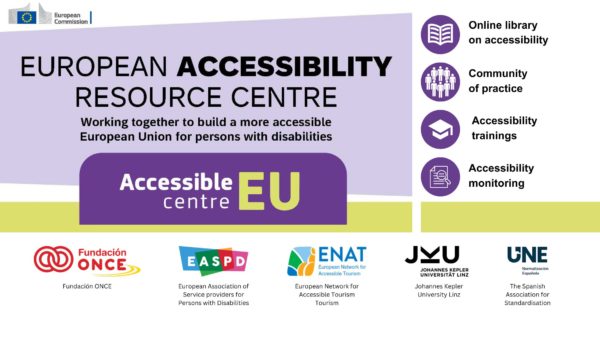Ongoing AccessibleEU Centre
AccessibleEU is a resource centre on accessibility, working in the areas of built environment, transport, information and communication technologies, and accessibility policies, to ensure the participation of persons with disabilities in all areas of life on an equal basis with others.
What is the AccessibleEU Centre?
AccessibleEU is one of the flagship initiatives proposed in the European Commission’s Strategy for the Rights of Persons with Disabilities 2021–2030.
AccessibleEU is a resource centre on accessibility, working in the areas of built environment, transport, information and communication technologies, and accessibility policies, to ensure the participation of persons with disabilities in all areas of life on an equal basis with others.
This is an EU-funded project which will be implemented in the years 2023-2026. The European Disability Forum welcomes the role of this centre, and keeps on calling the European Union to establish a new European agency on accessibility which can take and expand the responsibilities and scope of the AccessibleEU centre, and be sustainable over time.
What Accessible EU will do?
- Support the implementation of the European Union legislation on accessibility;
- Build the capacity on accessibility in EU countries;
- Connect stakeholders responsible for implementing accessibility rules in the EU;
- Create a common European one-stop-shop on accessibility;
- Train excellent professionals in the area of accessibility.
To achieve these, the AccessibleEU Centre will:
- Create an online library with key resources on accessibility for persons with disabilities in the areas of built environment, ICT and transport;
- Create a community of practice on accessibility, connecting accessibility and disability experts;
- Offer different trainings on accessibility;
- Support the monitoring of accessibility policies in EU countries;
- Organise 88 events per year at the European and national levels;
- Prepare one study per year on a selected topic on accessibility in Europe.
Who is behind Accessible EU?
AccessibleEU is funded by the Directorate-General Employment, Social Affairs of the European Commission and carried out by a consortium.
Consortium lead:
Consortium Partners:
- European Association of Service providers for Persons with Disabilities (EASPD)
- European Network for Accessible Tourism Tourism (ENAT)
- Johannes Kepler University Linz (JKU)
- The Spanish Association for Standardisation (UNE)
Subcontracted Partner organisations:
What is the role of EDF in AccessibleEU?
As a partner organisation in AccessibleEU, EDF is represented by Alejandro Moledo, EDF Deputy Director and Head of Policy. Alejandro is specialised in EU accessibility legislation by developing positions and recommendations regarding accessibility-related policies and standardisation activities.
In 2023 EDF will contribute with the following activities:
- Reviewing and contributing to the design of the annual work plan;
- Reviewing the design of the communication plan;
- Participating in at least 1 European awareness session;
- Participating in at least 1 European face-to-face networking session;
- Contributing to the design of the plan to revitalize the community of practice created by the AccessibleEU;
- Providing at least 25 potential contacts for the community of practice.
How to join the community of practice of the AccessibleU centre?
You can join the community of practice by filling out this form. This community of practice will bring together people and organisations that play a key role in promoting accessibility in Europe. EDF members and experts are encouraged to join.
And you can also join the LinkedIn group.
Contact
Website: www.AccessibleEUCentre.eu
Email: accessibleeu@fundaciononce.es

Contact
Alejandro Moledo
EDF Deputy Director and Head of Policy
Alejandro leads and coordinates EDF’s advocacy and policy work at EU level, and supports the work of the European Parliament Disability Intergroup. Among other areas, Alejandro has developed policy positions and recommendations regarding political participation of persons with disabilities, accessible Information and Communication Technologies, Assistive Technologies and different standardisation activities.